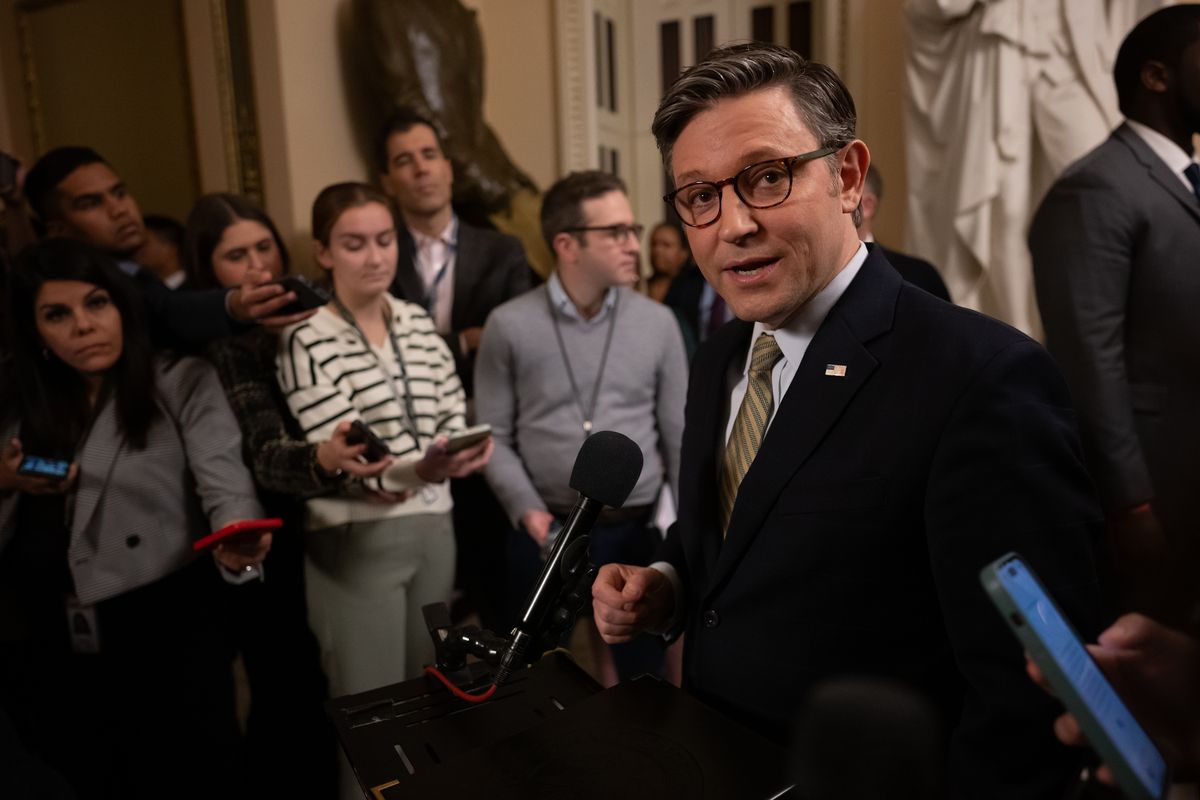
House Speaker Mike Johnson speaks to the media after the House passed a bill to avert a government shutdown on Dec. 20.
16:21 JST, January 3, 2025
With less than 24 hours to go, Speaker Mike Johnson is still working to win over a handful of Republican lawmakers who are skeptical of his leadership, raising the prospect of a close and contentious vote on Friday and increasing the risk that the intra-GOP battles that defined the 118th Congress will continue into the 119th.
Johnson (R-Louisiana) has spent the week working the phones and met with lawmakers in the Capitol through Thursday evening to try to better understand the concerns of roughly half a dozen hard-liners whose support he needs in the speakership election, which begins at noon. Many of the skeptics come from the ultraconservative House Freedom Caucus, which has spent the last year pushing their leaders to curtail government spending, or else.
To win the gavel on Friday, Johnson needs 218 votes if all House lawmakers are present and voting for a speaker candidate by name. Because of the resignation of Rep. Matt Gaetz (R-Florida) last month, House Republicans will start the year with just 219 seats, meaning Johnson can afford to lose just one GOP vote. Rep. Thomas Massie (R-Kentucky) has said he’ll definitely vote against Johnson, so the speaker would need every other Republican vote.
If Johnson cannot get the necessary votes, the House keeps voting until a speaker is elected because, without one, lawmakers cannot be sworn in to begin voting.
In a Fox News interview Thursday, Johnson said conversations have focused on “process reforms in the House.” Two people familiar with the discussions, who spoke on the condition of anonymity to outline private, ongoing negotiations, said the speaker was referencing efforts to ensure House Republicans can quickly pass conservative legislation while also cutting spending.
After meeting with holdouts Thursday afternoon, Johnson predicted again on Fox that he would receive “maybe one no vote” and remained “hopeful” that he can win back the gavel on the first round of voting.
President-elect Donald Trump this week threw his weight behind Johnson, arguing he is best equipped to implement conservative reforms. Ahead of his New Year’s Eve party at his Mar-a-Lago Club, Trump told reporters he believes the holdouts will ultimately support Johnson because he is the only House Republican who can clinch enough votes to win the gavel.
“He’s the one who can win right now. People like him. Almost everybody likes him,” Trump said. Though there are others who would be “very good,” he added, “they have 30 or 40 people that don’t like them, so that’s pretty tough,” he said, without naming names.
Asked if he was calling to pressure the holdouts, Trump said he would, if necessary, but that he believes Johnson has the votes. “Really we’re going to have a great time and get a successful vote. [Johnson’s] a good man, he’s a very wonderful person and that’s what you need.”
Trump’s endorsement earlier this week seemed to sway some lawmakers. Rep. Josh Brecheen (R-Oklahoma), who voted against Johnson’s stopgap funding bill last month, posted after Trump’s endorsement that he believes Johnson and Trump “are the winning combination to deliver results within our window of opportunity.”
But other members of the House Freedom Caucus remain undecided about whether to support Johnson. They want to know how Johnson will cut spending while also pushing forward Trump’s agenda.
Rep. Chip Roy (R-Texas), a key holdout who has been in conversations for several weeks about possibly replacing Johnson, said Wednesday that Johnson’s mishandling of the latest government funding bill cannot happen again.
“The reason I am still undecided on the Speaker vote (as opposed to hard no) is it’s not ALL the fault of @SpeakerJohnson & my desire is to give him grace & @realDonaldTrump room to deliver on a strong agenda for which we were elected. But something MUST change,” he wrote.
Congress must first address the debt ceiling, which could require the federal government to take “extraordinary measures” if it is not lifted as soon as Jan. 14, according to Treasury Secretary Janet L. Yellen.
Shortly after Trump’s inauguration on Jan. 20, the incoming administration wants the GOP-led Congress to pass policies addressing border security and energy-related reforms before working on reauthorizing Trump’s 2017 tax law.
Johnson and his leadership team released a 32-page document on New Year’s Day that outlines their legislative priorities and how the chamber should operate. While all 12 bills expected to be passed in the coming weeks are core conservative priorities Republicans campaigned on, they do not address all of Trump’s agenda.
Johnson and his allies argue that getting all that done will be possible only if the party sticks together, starting with unifying around reelecting him as speaker. “As the Republican leadership in Congress, we have prepared an aggressive plan to remove any roadblocks and provide a glidepath for President Trump’s reforms and policy agenda,” Johnson and three of his deputies wrote in a joint op-ed Wednesday. “To implement that vision, we must remain united.”
Top Articles in News Services
-

Survey Shows False Election Info Perceived as True
-

Hong Kong Ex-Publisher Jimmy Lai’s Sentence Raises International Outcry as China Defends It
-

Japan’s Nikkei Stock Average Touches 58,000 as Yen, Jgbs Rally on Election Fallout (UPDATE 1)
-

Japan’s Nikkei Stock Average Falls as US-Iran Tensions Unsettle Investors (UPDATE 1)
-

Trump Names Former Federal Reserve Governor Warsh as the Next Fed Chair, Replacing Powell
JN ACCESS RANKING
-

Producer Behind Pop Group XG Arrested for Cocaine Possession
-

Japan PM Takaichi’s Cabinet Resigns en Masse
-

Man Infected with Measles Reportedly Dined at Restaurant in Tokyo Station
-

Israeli Ambassador to Japan Speaks about Japan’s Role in the Reconstruction of Gaza
-

Videos Plagiarized, Reposted with False Subtitles Claiming ‘Ryukyu Belongs to China’; Anti-China False Information Also Posted in Japan
























